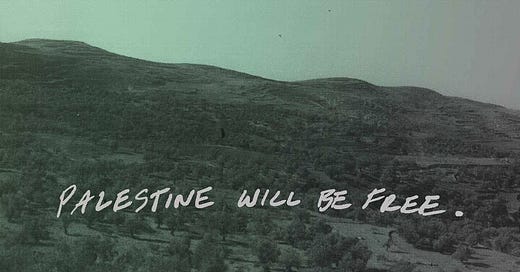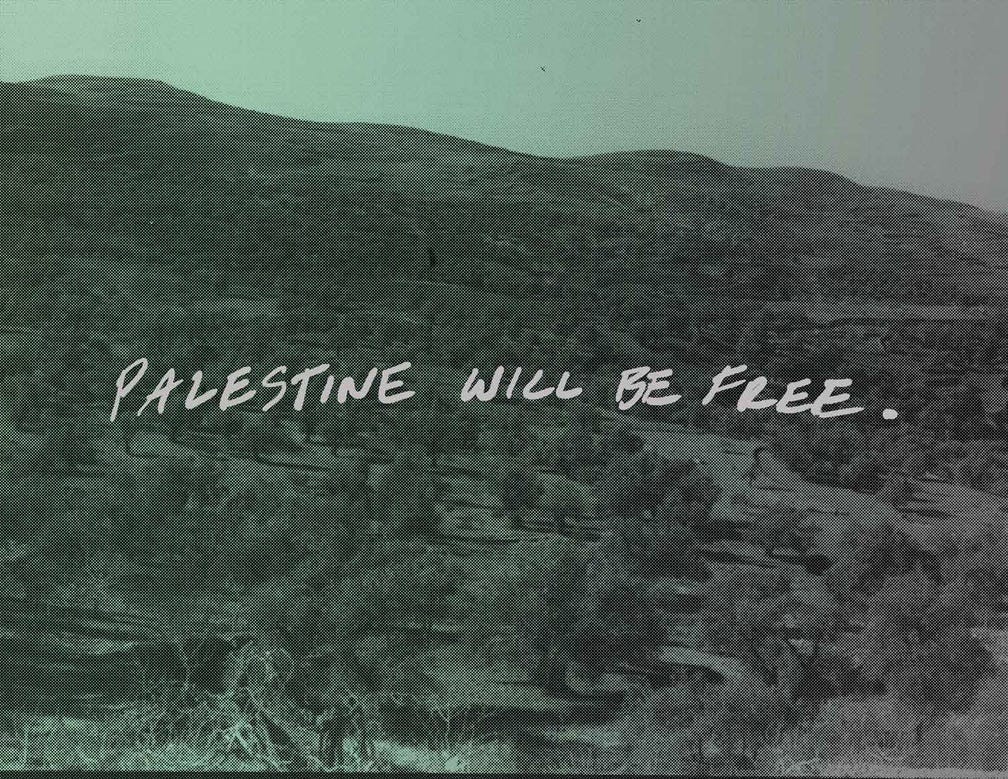Cover Image: Tina Orlandini for AgitArte
I’m looking back at the past couple weeks. All passing through my mind, including the words I write and read.
At the forefront of my heart and mind is what’s happening in Palestine and Israel:
Not only what happened on October 7th.
What is happening now and before now.
The families in Gaza and the genocide being committed against them by the United States and Israeli Governments.
The Palestinians’ work towards a free Palestine. Their resistance against Israeli occupation.
Israelis held hostage in Gaza and their relatives. The Israeli families who were murdered and experienced violence from Hamas near Gaza.
Palestinians in the West Bank and their ongoing loss of land. How they’re being murdered by Israeli setters while fighting for liberation.
Holding and acknowledging each violence. How violence brings more violence.
-
The history. How context is being ignored or erased by media in the US and abroad when all happened on October 7th.
What Sarah Schulman, American novelist and playwright says in “Explanations Are Not Excuses”, from New York Magazine:
Among political and institutional leaders, there has been a collective refusal to see this horrible violence as the consequence of consistent, unending brutality — paid for by the United States in billions of dollars in aid to Israel per year. Instead, a familiar fog has overtaken so many. They pretend these decades of injustice never took place. That Gazans were not forced against their will to live under siege. That instead, a group of them suddenly — out of nowhere and with no history or experience — emerged as monsters and murdered people who had never hurt them in the past and held no threat over their future.
…
Selective recognition is the way we maintain our own sense of goodness. As Israel began its relentless retaliation last week, an accompanying image of Israeli and American moral cleanliness was put swiftly into action. This is called “manufactured consent” — Noam Chomsky’s term for a system-supported propaganda by which authorities and media agree on a simplified reality, and it becomes the assumptive truth.
The word ‘goodness’ and how it’s defined. Who gets to define it. Who it represents.
Humans want to be innocent. Better than innocent is the innocent victim. The innocent victim is eligible for compassion and does not have to carry the burden of self-criticism.
The United States throughout history using the role of “innocent victim” as justification for violence.
-
Can there be such a thing as goodness?
-
The word ‘start’ and how it doesn’t apply here. The harm done to Palestinians by the Israeli government is ongoing.
The meaning of history. Ongoingness. Can history be ongoing?
When does history start? The space between was and now?
Is the space a second? Can the space be?
When does one decide the past as history?
How insignificant a second can seem. How that second fails to confront the was and now when violence is continuous.
-
Time. It’s many rooms I’m passing through. The rooms I’m passing through are exactly the same.
The rooms are the same and then they transform. As I pass through them. I transform too. Second by second.
The seconds as spaces. The spaces between my words. Spaces between my sentences. Spaces between my grammar.
The spaces are expected.
I come to mourn these expected spaces. What is called moment by moment.
The lack of space or the longevity of space can show how violence works in language. How violence works in and out of time.
-
Time fragmented. Within rooms. Rooms ongoing and continuous.
My selves are ongoing. Are continuous. The rooms and selves aren’t replicated. They are. Transforming within each space.
Within each room there are slight differences I fail to notice. Others I keep noticing. Watching the slow transformation.
My many selves. In many rooms. Are calling through each threshold. Voices echoing against each other. I look back and see multiple versions of myself, what is, what could be, what never was.
Time and the many forms it takes.
Rooms and their relation to each other.
I’m using rooms here. The homes they make. The meanings they contain. The memories.
Memories of Palestine. Memories between Gazan families. The prayers and stories spoken. Within the rooms they make and remake. Before, during, and after bombardments.
There is an interview on ABC with Fady Joudah, a Palestinian American poet, physician, and translator. He says.
Homes hold memories... There is a mass murder to memory.
I’m thinking of many forms of time and many forms of home. Created and destroyed.
To see Palestinians’ full complexity. What never was and could have been. How this is the ongoing work of colonization.
I don’t always understand, but I know their words are with us. Reminding us what it means to live. To survive the best one can.
-
What does history mean? What is told? What is left out?
That the land in Palestine and Israel was taken from Palestinians in 1948. Their history does not start in 1948.
The formation of Israel and Palestine connects to the United States.
The United States playing a major part in the violence happening in Gaza and the West Bank.
How much the leadership in the US, the president, are choosing to support and take part in genocide.
My role in this, as my tax dollars are funding weapons.
The violence in Palestine connects to our police forces and prisons in the United States.
The United States was created by forcibly removing and murdering Indigenous Peoples.
All connected.
-
History is ongoing. It connects to me living on stolen land. How I move in the world.
I’m reminded by what Zach Stafford, a journalist said on Vibe Check on October 17th:
You find your identity intermingled with how power has shaped and molded the world.
How power connects to all of us and how we are shaped and moved by it all.
-
The word ‘violence’ and its blanket use in times of unrelenting horror. What types of violences are happening?
What Tareq Baconi, scholar and author, says to Isaac Chotiner in The New Yorker:
—we need to understand that colonial violence instills dehumanization both in the oppressor and in the oppressed.
We need to recognize that anti-colonial struggles are violent. But not all of that violence is in pursuit of a political project. As you say, violence occurs for all different sorts of reasons. We need to be able to hold that truth while also recognizing the ethical purpose of ending apartheid.
What Arielle Angel, Editor-in-chief at Jewish Currents, says in “We Cannot Cross Until We Carry Each Other”:
But what Exodus reminds us is that the dehumanization that is required to oppress and occupy another people always dehumanizes the oppressor in turn. For people who feel like their pain is being devalued, it’s because it is; and that devaluation is itself a hallmark of the cycle of the diminishing value of human life. As the abolitionist geographer Ruth Wilson Gilmore has said, “Where life is precious, life is precious.”
One of the most terrible things about this event is the sense of its inevitability. The violence of apartheid and colonialism begets more violence. Many people have struggled with the straightjacket of this inevitability, straining to articulate that its recognition does not mean its embrace. I am reminding myself that it was from Palestinians, many of them writing and speaking in these pages, that I learned to think of Palestine as a site of possibility—a place where the very idea of the nation-state, which has so harmed both peoples, could be remade or destroyed entirely.
Even if our dreams for better have failed, they must accompany us through this moment to the other side. We need to imagine a movement for liberation better even than the Exodus—an exodus where neither people has to leave.
How each family in Gaza has their own fears, hopes, and dreams.
“As a site of possibility”
What civil rights attorney and writer Dylan Saba Says in “Point of No Return” from Jewish Currents:
Like return, a shared lexicon with divergent meanings, land, too, encompasses contradictory philosophies—surfacing as both an object of colonial domination and a critical component of decolonial movements. We say “land,” but mostly we mean “territory.” Land is the physical world—the wild, unbordered field of nonhuman intelligences—and territory the virtual space we make and remake upon it, passively through habit and actively through enclosure.
But the exile can return to the land, as the body returns to it in death, ready to deterritorialize themselves and the colony, to destroy the borders inscribing mind and body. Only then might a new territory form, built from relations of care and not hierarchies of control. May we return, then, to the origin of no origins not to solve the problem of exile but to destroy it for good.
-
The children in Gaza and the West Bank. Their imaginations. The hidden places they find in their hearts and minds to try and survive the bombings. The warmth they feel against their family’s chest when they try to sleep. How they try to dream. Try to sleep in the night. Their smiles. Their whispered games. The distractions they try to create. The visions in their head of somewhere safe. Nestled between family members. Their fear. Their fierce love and loyalty. Their laughs that make others laugh. Their inside jokes. Their small and simple ways they respond to the violence. To try and survive.
To know who they are and their faces.
To focus not just on the numbers, but their names. To remember.
-
I go to bed and thoughts flow through me and I struggle to sleep. For good reason. When I do sleep and wake up, the thoughts return. For good reason.
How am I supposed to be in this time we call day to day when violence is happening?
How do I live within was and now?
I feel no movement forward. It fails me. I desire disruption.
The changes between day and night, mean what, to me?
I desire for time’s propulsion to forsake us just once. For the choices made by world leaders saying yes to this destruction to unravel.
To shatter, fracture, incomprehensible on the floors they stand on. Unable to reassemble.
For the thoughts wrapped in violence to hit the edge of their tongue and disappear.
For their thoughts to be stuck in the worlds of themselves. The thresholds between time. Between worlds. Fighting over their desire to be. To be so caught up in each other. Stuck in their thresholds. Unable to pass through.
How thoughts become. Coherent. Ideas. Words. Spoken. Planned. Acted. Again. Again. Again.
-
The poet Harmony Holiday says towards the end of her Substack post, Love’s in Need of Love Today:
…but one consequence of unrepentant genocide is that from its clutches, you’ll never catch the delighted fantasy hidden between your justifications for hatred and eventually, uninterrupted, there will be no one left to hate but yourselves.
-
I write this down to move toward something better. To continue resisting. I am a writer and I try to look at life on a more detailed level, to remind myself how precious, and complex life is.
I think of all this and I hope you are finding a way to relate in these happenings and move towards action too. Ways to resist genocide, because what is happening is genocide against Palestinians.





Thanks for sharing what's on your mind, and connecting me with others' thoughts, too, like the Jewish Currents post. Aurora Levins Morales' "Red Sea" poem at the end will stick with me.